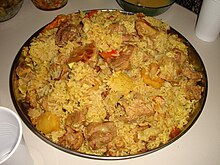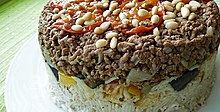This article is about the Levantine dish. For the sinkhole in Malta, see Maqluba (Malta).
 | |
| Alternative names | Maaluba, maqlouba, maqlooba, maqloubeh, makluba, maklouba, makloubeh, magluba, maglouba |
|---|---|
| Course | Meal |
| Place of origin | Jordan, Lebanon, Palestine, Syria, Iraq |
| Region or state | Levant, Mesopotamia |
| Associated cuisine | Levantine (Jordanian, Lebanese, Palestinian, Syrian), Iraqi |
| Serving temperature | Hot |
| Main ingredients | Meat, rice, and vegetables (tomato, cauliflower, potato, eggplant) |
Maqluba (also attested by a variety of other spellings in English; Arabic: مَقْلُوبَة, romanized: maqlūba, lit. 'upside-down') is a traditional Levantine dish, a variety of Pilaf that is popular across Palestine, Jordan, Syria, Lebanon, and Iraq. It consists of meat, rice, and fried vegetables placed in a pot which is flipped upside down when served, hence the name.
The earliest mention of the dish is found in a 13th-century cookbook, Kitāb al-Ṭabīkh (The Book of Dishes), written by Muhammad Baghdadi during the Abbasid Caliphate. In the context of the Israeli–Palestinian conflict, Palestinians have described attempts to label the dish as Israeli as cultural appropriation.
Ingredients

Maqluba can include various vegetables, such as fried tomatoes, potatoes, cauliflower, and eggplant, accompanied by either chicken or lamb. The most common are cauliflower and eggplant. All the ingredients are carefully placed in the pot in layers, so that when the pot is inverted for serving, the dish looks like a layer cake.
Maqluba is typically garnished with pine nuts and chopped fresh parsley. It is sometimes served with salad and fresh yogurt, and is often prepared for feasts and large gatherings.
Politics
The dish has been a matter of controversy in the Israeli–Palestinian conflict, with Palestinians describing attempts to label the dish as Israeli as amounting to cultural appropriation. The dish has been used by Palestinian activists to mobilize people to join protests at Al-Aqsa Mosque in the Israeli-occupied East Jerusalem; in 2017, Israeli police arrested a Palestinian woman who had organized a maqluba eating gathering at Al-Aqsa.
Since the unsuccessful coup attempt in Turkey in 2016, which involved the Gülen movement, the dish has been seen as a "Gulenist delicacy" and eating or preparing it has been considered by some as evidence of membership of the movement.
See also
- Arab cuisine
- Egyptian cuisine
- Israeli cuisine
- Jordanian cuisine
- List of casserole dishes
- Macaroni Hamin
- Palestinian cuisine
- Pilaf
References
- Carty, Elizabeth (September 24, 2012). Shrewd Food: A New Way of Shopping, Cooking and Eating. Hachette Books Ireland. p. 256. ISBN 9781444725780.
- Shaheen (29 January 2020). "Maqluba--The Paella of Palestine". Arab America. Retrieved 2020-07-20.
- Behnke, Alison (2005). Cooking the Middle Eastern way. Ehramjian, Vartkes. Minneapolis: Lerner Publications Co. p. 50. ISBN 0-8225-3288-3. OCLC 59008909.
- Bidoun. "Cooking with Maha Alusi". Bidoun. Retrieved 2019-01-04.
- Timothy L. Gall; Jeneen Hobby (2009). Worldmark Encyclopedia of Cultures and Daily Life. Gale. p. 782. ISBN 978-1-4144-4892-3.
The most traditional Palestinian meals are maqluba, musakhan, and mansaf
- Ottolenghi, Yotam (2015). "Jerusalem on a Plate". Gastronomica: The Journal of Critical Food Studies. 15 (1). University of California Press: 3. doi:10.1525/gfc.2015.15.1.1. ISSN 1529-3262.
Maqluba, an upside-down rice and vegetable cake that is actually Palestinian
- Elizabeth Carty (24 September 2012). Shrewd Food: A New Way of Shopping, Cooking and Eating. Hachette Books Ireland. ISBN 9781444725780.
- Swift, Robert (2016-03-07). "Maqluba - Eating Upside Down". The Media Line. Retrieved 2018-12-11.
- ^ Lam, Francis (5 January 2017). "A Middle Eastern Layer Cake for Dinner". The New York Times. Retrieved 13 November 2018.
- "Ramadan recipe: maqluba – upside-down lamb, aubergine and rice". The National. 18 April 2021. Retrieved 29 November 2023.
- ^ "On the Settler Colonial Elimination of Palestine Get access Arrow". Cornell University Press. 1 December 2020. Retrieved 29 November 2023.
- "Cooks.com - Recipe - Maqluba (Cauliflower with rice)".
- Linda Gradstein (6 December 2015). "Eucalyptus offers food from the Bible". Jerusalem Post. Retrieved 12 November 2018.
- "Maqlooba (Maqluba), Palestinian Upside Down Rice Recipe". LinsFood | by Azlin Bloor. 2013-07-21. Retrieved 2018-12-04.
- "Palestinian national dish fuels Al-Aqsa protests". Almonitor. 11 January 2018. Archived from the original on 2021-05-15. Retrieved 29 November 2023.
- Gauthier-Villars, David (2018-04-17). "U.S. Pastor Held in Turkey Denies Links to Terrorists". Wall Street Journal. ISSN 0099-9660. Retrieved 2020-12-17.